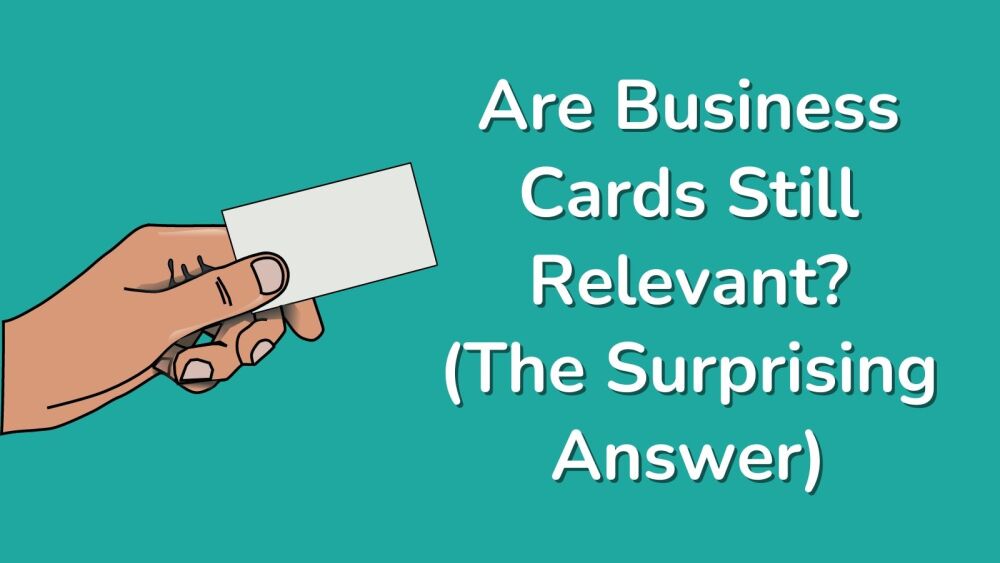Are Business Cards Still Relevant? (The Surprising Answer)
Posted on
Launching a new business is exhilarating. Social media, email lists, and captivating photos are fantastic ways to spread the word. But none of them packs the old-school charm of a business card.
Sure, printing costs exist, but consider this: business cards subtly grab attention. Imagine someone sticking your card on their office bulletin board. There it sits, passively advertising your business 24/7.
In fact, did you know that printing shops still print around 27 million business cards globally every day? There's a reason for that! Let's dive into why business cards remain relevant:

Why Business Cards are Still Relevant
-
Professional Polish: When someone asks for your contact details, scrambling around for pen and paper is unprofessional. A business card is a smooth, prepared response. They get your information instantly, with no dead batteries or awkward fumbling around involved!
-
Memory Makers: Our digital world makes remembering names tough. A business card acts as a tangible reminder. It's a physical token that stands out from the endless stream of digital contacts. Bonus points: Modern cards can even hold QR codes, allowing easy website access with a quick scan.
-
Enduring Value: Yes, we live in a digital age, but physical evidence suggests business cards haven't gone extinct. Look at any reception desk – they're overflowing with cards waiting to be picked up. Not everyone thrives in a digital world. Business cards offer a simple, grab-and-go solution for those who prefer offline methods.
-
The Personal Touch: A business card is a physical extension of you. It's something tangible they can hold and interact with. It's a far cry from staring at your name on a screen. This personal touch is way better than convenience.
-
Cost-Effective Marketing: Contrary to popular belief, business cards are budget-friendly. Using an online print shop makes getting them affordable. Sure, fancy designs like foil business cards might cost a bit extra, but they're an investment in attracting new clients, which is definitely exciting! You can even customise order quantities to ensure everyone on your team has a card.
-
Marketing on the Go: Business cards are mobile marketing tools. Leave them anywhere you go – networking events, product deliveries, anywhere your target audience might be. It's a simple way to ensure potential customers can easily connect with you whenever they need your services.
Pros, Cons and The Verdict on Business Cards in the Digital Age
Business cards hold a debatable position in today's digital world. Here's a breakdown of both sides:
Arguments for Business Cards:
-
Tangible Reminder: A physical card creates a stronger memory connection than a digital exchange. People are more likely to remember someone who hands them a card.
-
Networking Tool: Business cards offer a smooth way to exchange contact information during face-to-face interactions, like conferences or meetings.
-
Brand Representation: A well-designed card reflects professionalism and creates a positive first impression. Cards can be customised to suit the branding with intriguing designs such as transparent business cards or metallic business cards.
-
Leave-Behind Marketing: Cards can be left at strategic locations to generate leads or brand awareness.
Arguments Against Business Cards:
-
Digital Alternatives: Contact information can be easily shared electronically through QR codes, vCards, or social media profiles.
-
Environmental Impact: Printing cards creates paper waste, which can be a concern for eco-conscious individuals.
-
Outdated Information: Physical cards become outdated if your contact details change.
-
Limited Information: Cards offer limited space to showcase your skills or experience.
The Verdict?
In the world of marketing your small business, business cards aren't dead yet! But they may not be for everyone. Here's how to decide:
-
If you network frequently in person: Consider having high-quality business cards.
-
If you're environmentally conscious: Explore digital alternatives like vCards or QR codes linked to your online profiles.
-
If you want a more robust marketing tool: Look into interactive business cards that link to your website or social media.
Ultimately, the best approach might be a hybrid - carrying business cards for in-person interactions and having a digital presence for online networking.
